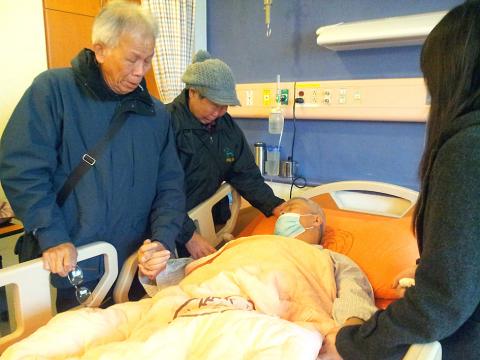|
Watchdog urges media restraint in
Makiyo case
By Shelley Shan and Chris Wang / Staff Reporters

Family of the taxi driver who
Taiwanese-Japanese singer Makiyo’s friend Takateru Tomoyori allegedly assaulted
visit him at Taipei Medical University Hospital yesterday.
Photo: CNA
The National Communications Commission
yesterday urged the media to exercise self-discipline when covering an alleged
altercation involving singer and actress Makiyo, adding that it will closely
monitor if any media outlet violates regulations.
Makiyo’s Japanese friend Takateru Tomoyori is alleged to have attacked a taxi
driver after refusing to buckle up his seatbelt. The driver, surnamed Lin (林),
sustained serious head injuries, two fractured ribs and a concussion.
The incident caused a media sensation as more details were released after
prosecutors launched an investigation.
Prosecutors yesterday said they were investigating whether Makiyo, a
Taiwan-based Taiwanese-Japanese starlet, took part in last week’s assault, after
questioning a witness who filmed the incident.
Makiyo and Tomoyori could be summoned for questioning again later in the day,
prosecutors said.
The witness was another taxi driver identified by his surname Chiang (蔣).
A video taken from a dashboard camera on Chiang’s car shows a woman dressed in
white appearing to kick the victim.
Chiang told prosecutors he was not sure if the woman was Makiyo and that he only
knew there was a fight.
An investigation found that the incident occurred on Friday last week after
Tomoyori, Makiyo and two local starlets known as Yaz and Vanessa got into a
taxi.
The driver asked Makiyo to fasten her rear seat belt, but she refused and an
argument ensued.
Tomoyori later allegedly assaulted and seriously injured the driver.
In earlier reports, Makiyo was said to have kicked the taxi, but was not accused
of having taken part in the alleged assault.
The case has sparked a public outcry in Taiwan, with thousands of netizens
backing an online campaign to boycott Makiyo and her friends.
However, the media coverage has led to a backlash.
Jason Ho (何吉森), director of the commission’s communication content department,
said the commission had received more than 20 complaints over the media coverage
of the incident, from TV news programs and entertainment shows to talk shows.
“Media outlets kept reporting the incident because more information was revealed
daily,” Ho said.
“Some members of the audience have said that the media have over-reported it,
while others said the media had appeared to put the accused on trial. We cannot
ban the media from reporting [the incident]. We can only ask the media to
restrain themselves since prosecutors have begun to investigate the incident.
There are other things that people care about,” Ho said.
Ho said some people had also complained about ETTV’s talk show This Is It
(關鍵報告), in which one of the invited guests explained in detail how the driver
had been beaten.
When asked if the content could potentially violate the Children and Youth
Welfare Act (兒童少年福利法), Ho said that the department would have to examine the
recorded material first.
Ho said the commission has called the journalism self--disciplinary committee of
the Satellite Television Broadcasting Association and asked it to review the
coverage of its members.
“We will intervene if the coverage has indeed crossed the line,” Ho said, adding
that the commission could only ask the media to restrict coverage.
Meanwhile, Chen Chang-pang (陳昌邦), an official at the Bureau of Employment and
Vocational Training under the Council for Labor Affairs, said foreigners who
violate Republic of China (ROC) laws would be stripped of their working permit
and not be able to reapply for a working permit for three years.
A foreigner would be ordered to leave the country if his or her working permit
were canceled, Chen told a press conference hosted by Democratic Progressive
Party (DPP) Legislator Huang Wei-cher (黃偉哲) to discuss legal aspects regarding
foreigners’ work permits and residency status in Taiwan.
“Those who hold dual nationality with a registered household in Taiwan enjoy the
same right to work [in Taiwan] as ROC nationals,” Chen said, adding that
dual-nationality holders without registered households would be treated as
foreigners, which means they have to apply for work permits in Taiwan.
A foreigner who is sentenced to a jail term of more than one year would be
stripped of his or her residence certificate and be subject to a compulsory exit
order, unless he or she is legally barred from leaving the country, said Lin
Chen-chih (林振智) of the National Immigration Agency.
Foreign nationals without a registered household in Taiwan who are sentenced to
prison could be stripped of their residency status and ordered to exit the
country within 10 days, Lin said.
However, both officials declined to comment directly on the case of Makiyo,
citing privacy and the principle of confidential investigation.
Additional reporting by CNA
|
![]()
![]()
![]()